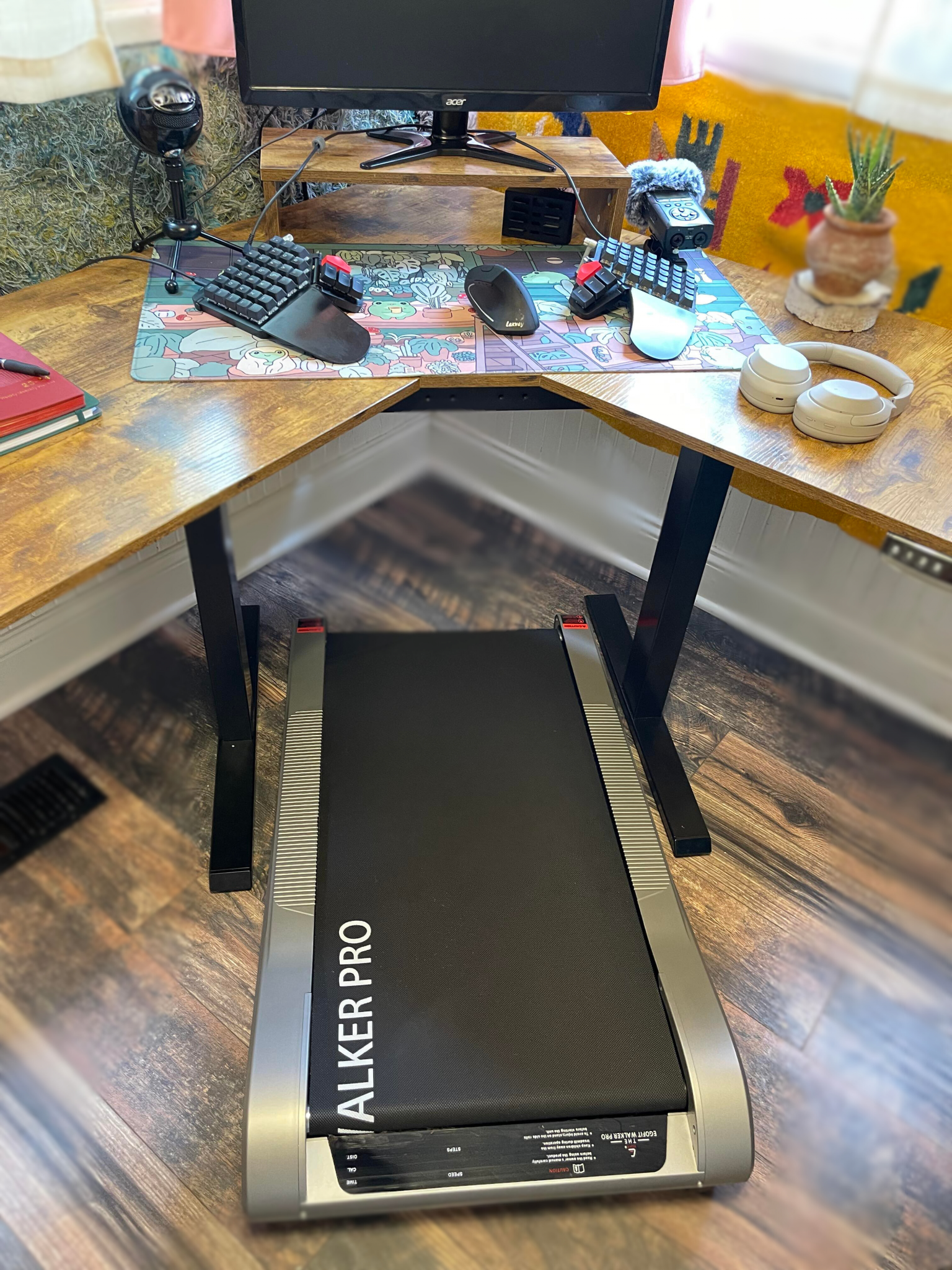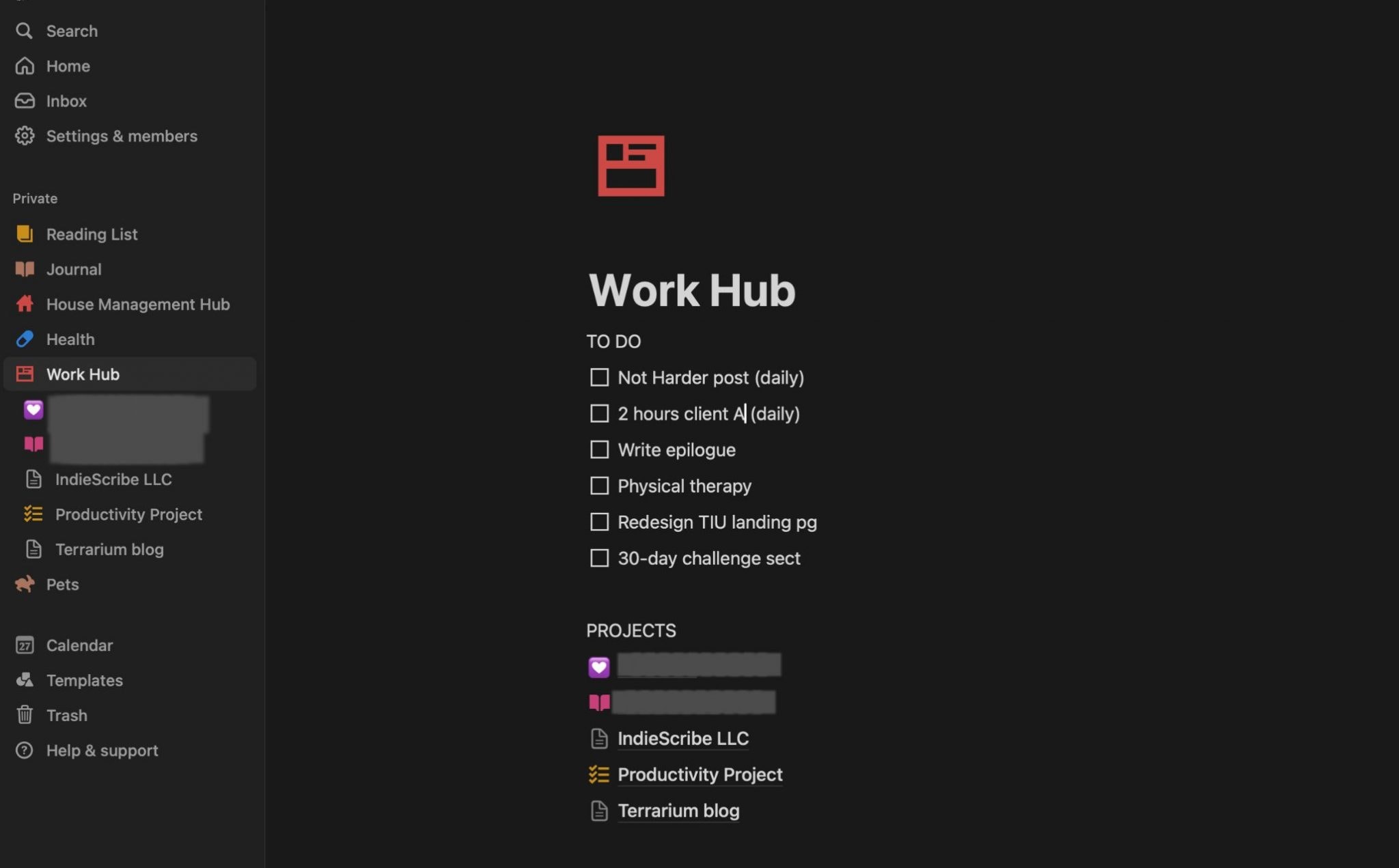Managing your own hours and work activity as a freelancer can be a tricky skill to master. It’s easy to overwork yourself, procrastinate half the day away, stay up until 3am, then sleep until noon. Let’s talk about how to be more productive as a freelancer, how many hours you can expect to work, and how to avoid procrastination.

How many hours a day should a freelancer work?
There are several factors that go into how many hours a day a freelancer should work, including the industry, their personal productivity rhythms, workload and deadlines, work-life balance, health, and client expectations.
The general advice is to pursue full-time hours (around 40 per week) if you want to be a “full-time” freelancer, and part-time hours (around 15 per week) if it’s a side hustle.
But I’d like to point to a few studies that show the typical full-time office employee is only productive for about 2-3 hours per workday. This might be due to poor time management, the natural limitations of human attention and energy, work culture, and distractions.
Maintaining 8 hours of true productivity in a workday is kind of impossible, it seems. Unless your job is something like a restaurant hostess, where you’re doing something the entire time you’re clocked in, workers (i.e., “computer” workers) are essentially paid to waste time.
That considered, an established freelancer might only work around 3 hours a day if they remain focused for the duration, depending on their industry.
A new freelancer will likely work more hours while they gain experience and clients. In the beginning, you might grab some low-paying work to collect testimonials or example pieces for your portfolio, which means you’ll need to work more hours.

Freelance Tips To Be More Productive
As a freelancer, you will need to stay on top of your productivity. There is no boss or supervisor to look over your work or ensure you’re meeting goals and deadlines. Here are a few things to keep in mind to maintain productivity while freelancing.
1. Set clear goals
Define your long and short term goals for your freelance career. Do you want to make it your full-time gig, or are you in it for a little extra cash and to practice a new skill?
Break your larger projects into manageable tasks with deadlines. When doing client work, set self-imposed deadlines before the client’s actual deadline to ensure time for edits, mistakes, and delays.
2. Create a routine
Freelancing–or working from home in any position–can create a challenge. If you work from home, you’re comfortable and more easily distracted. It can be harder to click into Work Mode when you’re in a physical home.
This makes a routine essential.
If you can work somewhere like a co-working space, even better!
Establish a daily schedule with specific working hours. Stick to a consistent routine to create structure and discipline. Many self-employed people find it helpful to change into work clothes before they begin. Staying in pajamas is tempting–I’m doing it now (it’s 7am, in my defense), but actually getting ready for the work day as if you’re leaving the house can help you properly Clock In.

3. Designate your workspace
A designated workspace is essential for a successful freelancing career. In my opinion, here are generally the best options, in order:
- Co-working space: a separate space, like a co-working center, can make you much more productive. For some people, it might make you less productive–know thyself.
- Home office: An entire room dedicated to a working space is ideal. This is where I work most of my days.
- Library: Libraries are free and often under-utilized. You’ll have to poke around for a private space, but libraries are typically quiet, well-lit, and again, free to be in.
- Coffee shop: Coffee shops can be great workspaces if you work better with people around. I recommend a good set of noise-cancelling headphones and maybe an extra monitor that can clip to your laptop.
- Hybrid: While this is last on the list, I think it might be one of the best options. I’ll work 90% of the time from my home office, but sometimes getting a little change of scenery by working in the garden, at a park, a library, or a coffee shop can shake up my creativity.
Once you have your dedicated workspace, you should optimize it to maximize productivity. That can look like:
- Investing in ergonomics
- Personalizing the area
- Organizing your work tools
- Keeping a clean digital space

4. Prioritize tasks
When unsupervised and unpracticed in self-management, prioritizing tasks might not come naturally. It’s tempting to do lower-impact, more accessible tasks, rather than tackling those important, more difficult things.
Learn to prioritize tasks properly so your time spent is more impactful. Here are a few task prioritization strategies you can try:
5. Practice time management
“Time management” is a bit of an amorphous concept, but it’s important to master for freelancers and self-employed professionals.
If time management doesn’t come naturally to you, try strategies like the Pomodoro, time blocking, and deep work.
With more experience, you’ll be able to develop your own time management strategies. After 14 years of self-employment, I’ve developed the schedule mentioned above, performing an hour of deep work on a particular subject, then taking half an hour off to clear my mind from that mode, maintain work-life balance, and avoid burnout before starting my next hour.
It’s also important to note that your strategy will probably be always-evolving, and that’s good! It should grow with you.
6. Limit distractions and set boundaries
The biggest challenge presented to most self-employed individuals is valuing their own time and setting boundaries with their loved ones.
If you’re already freelancing, you know exactly what I’m talking about. Your friends and family think that “self-employed” means “constantly available”.
The classic, “Mom, I’m working–“
“But you can do that anytime.”
It can be difficult, but when you respect your time and boundaries, others are forced to respect them, too. Put your foot down, block out distractions, and set intentional boundaries around your time and work.

7. Take regular breaks
Sometimes the problem is that we’re working TOO hard. Neglecting breaks and rest is tempting and easy when you’re your own boss and employee. Prioritize rest.
I’m so serious!
As a long-term self-employer, I spent my first few years working 12-hour days on most days. And a lot of weekends. Add on an abundance of other life responsibilities, and it’s unsustainable. I was in my early 20s, I had unlimited work to do, and I wanted to build something for myself. Then I hit a wall, as everyone eventually will if they neglect rest.
I became chronically ill, and, with that, came chronic fatigue. I couldn’t work at all. For a long while. Many days, I couldn’t even get out of bed. Years later, I’m still recovering. That’s why I take so many breaks and work such a contained amount of hours now. Because I was literally forced to rest. I’m not going to put myself in that position again, because IT SUCKS.
Don’t underestimate the health and productivity importance of taking breaks and getting adequate rest.
8. Stay organized for freelancer productivity
When you’re your own boss, you’re also your own accountant, marketer, manager, strategist, and everything else that might go into running a business. As such, staying organized can save yourself some serious headaches.
Keep up with your bookkeeping and taxes. For me, that looks like tracking expenses; tracking sales and invoices; estimating what I’ll owe in taxes the coming year, then setting aside at least 1/10 of that number each month. Technically I’m supposed to be paying quarterly taxes, but it makes more sense for me to put that money into a high-yield account and just pay the fee for not sending quarterly payments at the end of the year
Keep your files and documents organized with a consistent naming convention and folder structure. I keep all of my work information in Notion, so I know exactly where everything is and my work is streamlined.
Regularly cleaning your workspace (including your digital workspace) is much easier than needing to do an overhaul every few months because you’re up to your neck in bullshit you no longer need. I set a daily two-minute timer and speed-clean my office, and at the end of each day, I’ll file or delete my downloads from the day to keep everything in order.
Keep relevant client information in an accessible, secure place. Save contact information, a record of money exchanged, and anything else that might be relevant in one place for each client.
9. Network
Networking is important for any professional, even the self-employeds. Most jobs and opportunities happen because somebody knows a guy, so make part of your career strategy to know as many guys (gender neutral) as you can.
Make acquaintances, let people know what you offer, let your social network know when you’re open for new business. Ask to collaborate, if that’s relevant for your field, and try to meet some fellow freelancers!
10. Invest in professional development
Building skills and continued learning are essential for freelancers. Technology and society develop rapidly, and if you don’t keep up, you might be left behind. Try to stay up-to-date on big news, changes, opportunities, and threats in your industry.
Take online courses and workshops, earn certifications, and keep yourself updated on the latest tools, skills, and information. Not only will this keep you from falling behind, but it will make your services worth more, so you can charge more (and work less). You might even learn new skills to expand your service offerings.

11. Pay attention to healthy work-life balance
With freelancing, it can be difficult to keep a firm line between your work life and your personal life. If you work from home, your home is your office. If you only have one computer, it might be your workspace and your gaming console.
Freelancing can often mean long hours, particularly at the beginning, and sneaking your laptop to squeeze in some extra work during family movie night is a real temptation, so don’t be a total loser.
Try to stay cognizant of prioritizing your real life.
Project Management Tools for Freelancers
When running a freelance business, you need the right tools for the job, from keeping track of client to-do lists to managing your contacts.
A great project management tool to start you out is Notion, which is a hub for anything you could possibly need to organize for a client or project. You can create different folders, charts, and lists for specific tasks, prioritize your to-do lists, save relevant information and documents, and tons more.
You can access Notion on any of your digital devices, which makes it perfect for busy freelancers. The best part is you can make your system as complex or simple as you’d like!
For example, this is my incredibly basic Notion:

And this is a template for someone much cooler than me:

If you need a tool for time tracking, Toggl Track is probably your best bet. Track hours worked on specific clients for easy, accurate billing. Toggl also provides other services, like Toggl Plan (manage planning for teams), Toggl Hire (full-cycle hiring), or Toggl Work (expense management).
Either of the above productivity tools could help you manage your entire freelance business in one convenient place.
How do I stop procrastinating as a freelancer?
I know I harp on and on about proper breaks, rests, and work-life balance, but some people are on the other side of that spectrum and struggle to actually get work done.
So how do you stay on task, avoid procrastination, and get your work done? Here are a few ideas.
1. Know yourself
If you haven’t started a freelance career yet, are you sure you want to? It is really, truly not for everyone. The skill involved in self-management and discipline isn’t something that comes naturally for most people.
Unless you’ve already proven to yourself that you can handle that, I recommend testing it before you make any big life changes. Certainly don’t quit your day job before you’ve thoroughly kicked the tires and replaced enough of your income through freelance work.
If you’re just dipping your toes in the thought of employing yourself, put it into practice. Set up what a work day should look like, and work it. See how it goes. It will take practice, so give it some time and effort, and be prepared to troubleshoot.
But ultimately, this isn’t a lifestyle most people can maintain, so proceed with caution.
2. Set clear goals and deadlines
To avoid procrastinating, figure out exactly what you’re trying to do. Set clear goals for yourself, and implement deadlines. If you have client-driven deadlines, self-impose an earlier one for wiggle room.
We’ve already discussed creating a schedule structure for yourself, but after you’ve made it, you also have to follow it. Hold yourself accountable! If you can’t, this isn’t the job for you.
Prioritize your tasks and build to-do lists intentionally. Use the methods linked above if you don’t have a process for this yet.
3. Reward yourself
For some people, finishing a job (and being paid for it) is plenty reward in itself, but it might make sense for you to create additional incentives for yourself, especially if you struggle with procrastination. Reward yourself for consistent effort and celebrate your achievements!
4. Don’t forget breaks
I’m a skipping record–someone tap me. Do NOT neglect regular breaks and appropriate rest. While you’re at it, put effort toward your health in general. Eat enough good food, move enough, get some sunshine, have positive social interactions. Taking care of yourself is what will make freelancing sustainable.
Freelancing–and any type of self-employment–is going to be a fully unique experience to each person. That’s because it’s fully customizable! While that’s an exciting prospect, it’s not something everyone jives with. Keep a finger on your own pulse and know if this is the career style for you. If you find it is, get intentional with your time and task management. A career is a career, even if you’re doing it from your couch in bunny slippers.
